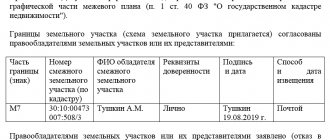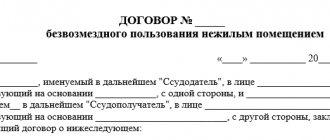The act of returning the apartment to the rental agreement: contents
Despite the fact that there is no specific form for filling out the act, like any other legal document, it must be drawn up in accordance with the general requirements of the Civil Code. The drawing up of the act as a component of the transaction is carried out in writing (Article 160 of the Civil Code of the Russian Federation). Based on the general requirements, the following items are considered mandatory:
- Indication of the number of the residential lease agreement to which this act is attached;
- Indication of the date of preparation of documents;
- Indication of the passport details of the tenant and the lessor;
- Indication of the full address of the transaction object - residential premises (city, street, house, apartment);
- Indication of the date of signing the document.
Also in the document it is necessary to state the fact of transfer of housing to the owner and note the absence or presence of identified deficiencies and inconsistencies that were not taken into account in the transfer act.
The procedure for signing the act of returning the apartment to the rental agreement
The process of drawing up a rental agreement is regulated by the Civil Code of the Russian Federation, in particular Article 671. Drawing up an act of return of the apartment is not a prerequisite for signing a rental agreement. The legislation does not have a specific standard form for this act. This act is drawn up together with the act of transferring the apartment for temporary use.
The acts are drawn up with the consent of the parties when signing the main agreement and are printed in duplicate. If drawn up correctly, it subsequently provides a guarantee that the residential premises will be returned in the same condition in which they were handed over for use. The act is also used for early termination of a tenancy agreement. Only after the parties sign this act is it considered that the owner of the residential premises has no claims against the tenant.
Analytics Publications
This article is devoted to certain issues of state registration of changes to a lease agreement, in relation to which the approaches of the courts have developed and changed over a fairly long period of time. Consideration of these approaches in their development will allow us to form a more accurate understanding of existing trends in judicial practice.
Approaches of the courts to the issue of mandatory state registration of changes to the lease agreement and the consequences of failure to complete such registration
According to one of the positions, only those agreements that change the content of the rental registration record are subject to state registration, for example, agreements to change the term or change the lease object. At the same time, agreements that do not change the content of the registration record, for example, on changing the procedure for paying compensation for inseparable improvements, do not require state registration (Resolution of the Arbitration Court of the Central District dated 03.11.2016 in case No. A35-7371/2015; Resolution of the Federal Antimonopoly Service of the Volga District dated 28.12 .2011 in case No. A57-22497/2009).
According to the opposite position, if an agreement is subject to state registration, then all changes and additions to it, as part of this agreement, are also subject to state registration (Resolution of the Presidium of the Supreme Arbitration Court of the Russian Federation dated January 27, 2009 No. 11680/08 in case No. A70-2321/10-2007 ; Resolution of the Presidium of the Supreme Arbitration Court of the Russian Federation dated 02/05/2013 No. 11241/12; Resolution of the Arbitration Court of the Far Eastern District dated 04/24/2017 in case No. A51-17551/2016).
Let's consider the consequences of not registering changes to the lease agreement.
For quite a long period of time, the courts were of the opinion that the failure to register an additional agreement to the lease agreement entails the non-conclusion of such an additional agreement. Applying this approach, the courts came to the conclusion that an additional agreement that has not undergone state registration does not give rise to rights and obligations for the parties to the lease agreement.
This approach created the opportunity for a party to a lease agreement to abuse its rights. So, for example, if the tenant did not want to fulfill the terms of the additional agreement signed by him, but not registered, to increase the rent, he could refuse to fulfill it, declaring that such an agreement had not been concluded (Clause 9 of the Information Letter of the Presidium of the Supreme Arbitration Court of the Russian Federation dated February 16, 2001 No. 59; Resolution of the Federal Antimonopoly Service of the East Siberian District dated 09/06/2007 in case No. A19-25747/06).
However, already in 2011, the Supreme Arbitration Court of the Russian Federation indicated in paragraph 14 of the Resolution of the Plenum of the Supreme Arbitration Court of the Russian Federation dated November 17, 2011 No. 73 “On certain issues of the practice of applying the rules of the Civil Code of the Russian Federation on a lease agreement”, that if the parties reached an agreement in the required form on all essential terms of the lease agreement, the owner transferred the property for use, and another person accepted it without any comments, the agreement on the amount of payment for the use of the property and other conditions of use was reached by the parties and was fulfilled by them, then in this case it should be borne in mind that it bound them to an obligation that cannot be arbitrarily changed by either party regardless of violation of the registration requirement of this agreement.
At the same time, the Supreme Arbitration Court of the Russian Federation noted that the rights granted to a person using property under a lease agreement that has not passed state registration cannot be opposed to third parties. This idea was also confirmed in the Information Letter of the Presidium of the Supreme Arbitration Court of the Russian Federation dated February 25, 2014 No. 165 “Review of judicial practice on disputes related to the recognition of contracts as unconcluded.”
Thus, according to current judicial practice, unregistered changes to the lease agreement entail the emergence of rights and obligations for the parties to the transaction at the time of conclusion or actual execution of the corresponding additional agreement.
Following the above approach, the courts, for example, reject the parties' arguments that the rent increase carried out by the parties entering into an additional agreement is not subject to application, since the agreement was not registered in the manner prescribed by law.
However, it is necessary to take into account that if the additional agreement states that it comes into force (begins to operate) only from the moment of its state registration, then this agreement will not give rise to legal consequences for its parties until such registration is carried out (see the Resolution of the Arbitration Court of the Western-Russian Federation). Siberian District dated February 28, 2018 in case No. A70-6861/2017).
At the same time, for third parties, unregistered additional agreements are not concluded by virtue of paragraph 3 of Article 433 of the Civil Code of the Russian Federation.
For example, the Arbitration Court of the North-Western District in its Resolution dated December 12, 2017 in case No. A05-3316/2016 recognized that since additional agreements changing the amount of rent were not registered, the conditions provided for in them cannot be opposed to third ones persons, in particular, bankruptcy creditors in a bankruptcy case.
Unilateral change in rent amount
Conditions on the possibility of unilateral changes in rent are included in lease agreements quite often. This unilateral procedure is common, for example, in lease agreements for state or municipal property. In this case, the agreement, as a rule, stipulates that the lessor informs the tenant about the change in rent by sending a written notice.
According to the current position of the courts, a unilateral change in rent should be interpreted not as a change in the lease agreement, but as the implementation by the tenant of one of the conditions of a previously registered lease agreement. And since the implementation of the condition on the unilateral revision of the rent does not change the lease agreement, then, therefore, the signing of an additional agreement on the change in the rent and its state registration are not required (Determination of the Supreme Court of the Russian Federation dated March 20, 2015 No. 310-ES14-6794 in case No. A62 -8257/2012; Ruling of the Supreme Court of the Russian Federation dated 08/22/2016 No. 308-ES16-9526 in case No. A53-21597/2015; Ruling of the Supreme Court of the Russian Federation dated 01/30/2017 No. 310-ES16-19880 in case No. A62-9551/2015 ).
It is necessary, however, to take into account a number of requirements for setting out the conditions for a unilateral change in the amount of rent, compliance with which is necessary for the court to recognize this procedure as agreed (the implementation of which does not require the conclusion of an additional agreement and state registration of changes to the lease agreement):
- The lease agreement must explicitly state the landlord's right to unilaterally change the amount of rent.
The condition that the parties agree on a change in the amount of rent upon the occurrence of certain events is not recognized by the courts as a condition that gives a party to the contract the right to demand such changes or make them unilaterally.
- The lease agreement must provide for the frequency of unilateral changes in rent; the size by which it can be changed, or the procedure for determining it; as well as the conditions for such unilateral change.
So, for example, if the right to unilaterally change the amount of rent arises in connection with a change in the rental rate established by a regulatory act of the relevant authorized body, then it is necessary to directly indicate this in the lease agreement.
Issues of registration of changes made to a lease agreement during the transfer of rights and obligations under such an agreement in the order of succession as a result of the reorganization of a legal entity
Regarding the registration of changes to an agreement when rights and obligations under this agreement are transferred as a result of the reorganization of a legal entity, two questions can be distinguished:
- Is it required to register an encumbrance with the right to lease in favor of a legal entity that has become a party to the lease agreement as a result of the reorganization of the previous party to the agreement.
- To register changes, is it sufficient to submit documents confirming the reorganization of the former party to the lease agreement and the emergence of its legal successor, or is it necessary to conclude a corresponding additional agreement?
On the first issue, the Supreme Court of the Russian Federation expressed its opinion in Ruling No. 304-ES17-3429 dated July 25, 2017 in case No. A70-5203/2016, canceling acts of lower courts that obliged the tenant, who became the legal successor under the lease agreement as a result of reorganization, to register the encumbrance of a property with the right to lease a given legal entity. The court also reflected in the Determination that the imposition of this obligation on the tenant resulted in losses for him in the amount of over 20,000,000 rubles resulting from the payment of the duty.
It should be noted that on the second issue of the mandatory conclusion and submission for registration of an additional agreement on replacing a party to a lease agreement, there is no consensus of opinion in judicial practice.
For example, the Arbitration Court of the Central District, in its Resolution dated January 18, 2017 in case No. A68-3677/2016, recognized the refusal of Rosreestr to register changes to the land lease agreement related to the replacement of the tenant with his successor, which arose as a result of the reorganization of the previous tenant, as legal . The court indicated that since the applicant had not submitted an additional agreement to make appropriate changes to the lease agreement, Rosreestr had no grounds for registering such changes.
At the same time, there is also opposite judicial practice.
Thus, the Resolution of the Arbitration Court of the Ural District dated April 25, 2017 in case No. A60-34773/2016 states that when reorganizing a legal entity in the form of merger, as well as when changing the corporate name of a legal entity, the conclusion of additional agreements to the lease agreement is not required. At the same time, the court supports its position with a reference to paragraph 12 of the “Review of Judicial Practice of the RF Armed Forces No. 3 (2016)”, approved by the Presidium of the RF Armed Forces on October 19, 2016. In this regard, the court declared illegal Rosreestr’s refusal to register changes in the tenant’s name due to failure to provide an additional agreement to the lease agreement.
Registration of an additional agreement after the expiration of the lease term and (or) the validity period of the lease agreement
Let us dwell on the issue of the legality of registering an additional agreement to the lease agreement if, at the time of filing the corresponding application, the lease term and (or) the validity period of the agreement have expired.
According to Rosreestr, registration of changes to the lease agreement in this case is unlawful. The courts, however, take the opposite position, according to which the expiration of the period specified in the contract is not in itself an obstacle to the state registration of the submitted additional agreement, since the provisions of Articles 450, 452, 610, 621 of the Civil Code of the Russian Federation do not impossibly change the terms by agreement of the parties a lease agreement renewed after the expiration of the period specified with it (Resolution of the Arbitration Court of the North-Western District dated 06/09/2017 in case No. A56-52192/2016; Resolution of the Arbitration Court of the North-Western District dated 04/21/2017 in case No. A21-5227/2016 ).
Thus, taking into account the issues discussed in this article, we recommend that the parties to the lease agreement take into account the approaches of the courts described above when making a decision regarding registration of changes to the lease agreement.






